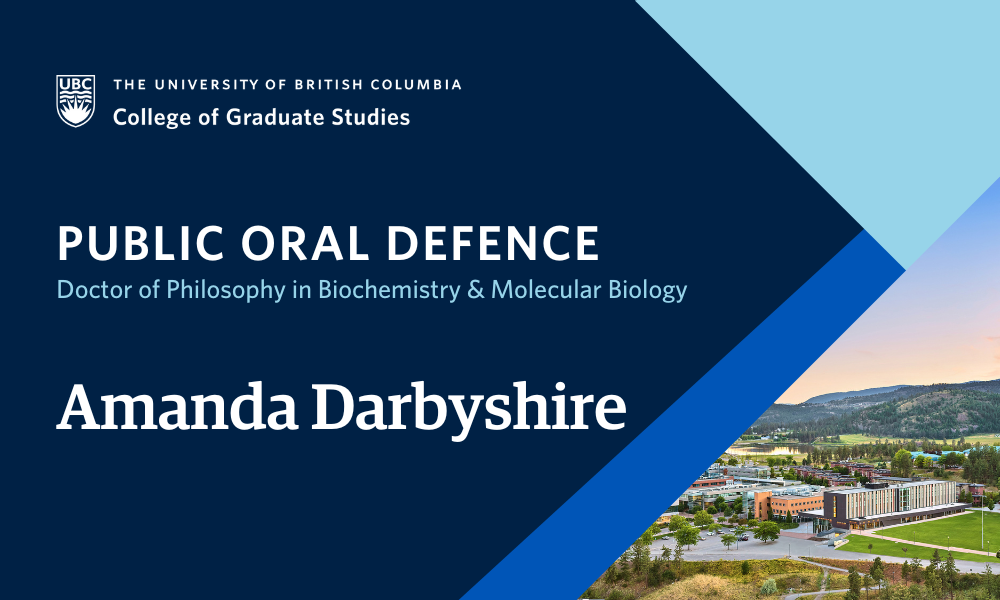
- This event has passed.
Dissertation Defence: Uncovering Distinct Aspects of Amino Acid Metabolism in Fusobacterium nucleatum
April 29, 2024 at 9:00 am - 1:00 pm

Amanda Darbyshire, supervised by Dr. Kirsten Wolthers, will defend their dissertation titled “Uncovering Distinct Aspects of Amino Acid Metabolism in Fusobacterium nucleatum” in partial fulfillment of the requirements for the degree of Doctor of Philosophy in Biochemistry and Molecular Biology.
An abstract for Amanda Darbyshire’s dissertation is included below.
Examinations are open to all members of the campus community as well as the general public. Registration is not required for in person exams.
ABSTRACT
Fusobacterium nucleatum is a gram-negative bacterium that ubiquitous in the human oral cavity and has been associated
to the development of periodontal disease, poor pregnancy outcomes, and most notably, colorectal cancer. This thesis
focuses on three distinct enzymatic pathways that are involved in F. nucleatum amino acid metabolism. Chapter 2 and 3
focus on serine synthase, a pyridoxal 5’-phosphate (PLP)-dependent enzyme that catalyzes the reversible reaction of
L-cysteine and H2O to form L-serine and H2S. The mechanism for this reaction requires the use of an aspartic acid
residue (D232) to act as a general acid/base catalyst. Hydrophobic residues surrounding D232 in the active site increase
the basicity of the carboxylate side chain and restrict the range of nucleophilic substrates that can dock into the second
binding site. Mutation of these aromatic residues allows for addition of thiol-based nucleophiles to the -aminoacrylate
intermediate of the PLP cofactor, thus allowing serine synthase to act as a potential biocatalytic tool for noncanonical
amino acid biosynthesis. Chapter 4 focuses on lanthionine synthase, another PLP-dependent enzyme which catalyzes
the -replacement reaction of L-cysteine with a second equivalent of L-cysteine to produce L,L-lanthionine. In this chapter,
we utilized the relaxed substrate scope of lanthionine synthase to produce different lanthionine analogs and test potential
inhibitors. We also determined that the physiological production of meso-lanthionine in F. nucleatum is likely through the
reaction of lanthionine synthase with L-cysteine and D-cysteine and not through an epimerase. Fn1732 in the F.
nucleatum genome may act as a racemace on an amino acid other than L,L-lanthionine. Chapter 5 investigates a putative
metallochaperone system for lysine 5,6-aminomutase (5,6-LAM). 5,6-LAM is a PLP- and adenosylcobalamin
(AdoCbl)-dependent enzyme involved in the second step of the lysine fermentation pathway, catalyzing the conversion of
-L-lysine to erythro-3,5-diaminohexanoate. Like other AdoCbl-dependent enzymes, 5,6-LAM undergoes suicide
inactivation during catalysis as a result of the loss of the 5’-deoxyadenosyl moiety and the irreversible oxidation of cob(II)
alamin to hydroxocobalamin. We have identified kamB and kamC, two genes responsible for the ATP-dependent
reactivation of 5,6-LAM. KamBC is structurally distinct from reactivating factors of other AdoCbl-dependent enzymes, and
therefore adds to the list of proteins that have evolved to maintain cellular activity of AdoCbl-dependent enzymes.